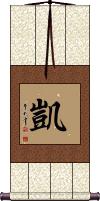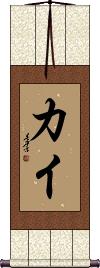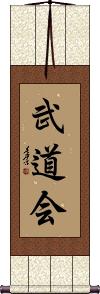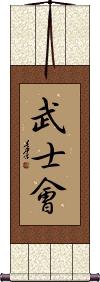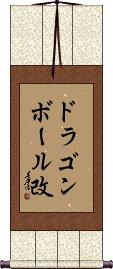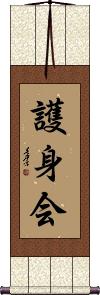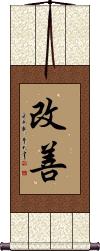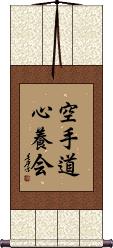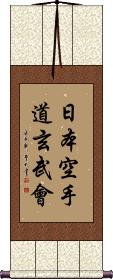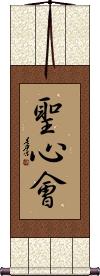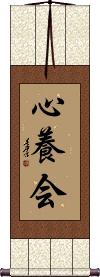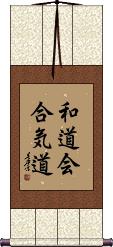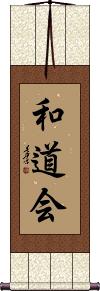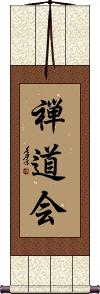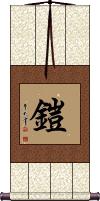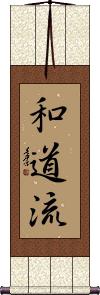The Name Kai in Japanese/Chinese on a Custom-Made Wall Scroll.
Click the "Customize" button next to your name below to start your personalized kai calligraphy artwork...
1. Kai
2. Budo-Kai
4. Bushi Kai
6. Goshin-Kai
7. Isshin-Kai
10. Nippon Karate-Do Genbu-Kai
12. Shinyo-Kai
13. Wado-Kai Aikido
14. Wado-Kai
15. Fudoshin-Kai
17. Armor
18. Wado-Ryu
19. Wado-Ryu Karate
凱 is the transliteration to Mandarin Chinese for the name Kai.
This Chinese character means triumphant or victorious. In Chinese, it can be the surname, Kai.
Note: In Japanese this can be the given name Tanoshi.
Budo-Kai
Budo Kai Jutsu
Bushi Kai
Dragon Ball Kai
ドラゴンボール改 is the name for Doragon Bōru Kai (Dragon Ball Revised), a high-definition remastered and recut of the original Dragon Ball Z, released on the 20th anniversary.
Note: Because this selection contains some special Japanese Katakana characters, it should be written by a Japanese calligrapher.
Goshin-Kai
Isshin-Kai
Isshin Society
一心会 is the Japanese martial arts title “Isshinkai” or “Isshin-Kai.”
It literally means “One Heart Association” or “Single-Heart Club.” This title is often associated with Isshin-Ryu Aikido and Isshin-Ryu Karate-Do. This title is an appropriate name for a dojo that teaches these styles.
In calligraphy, 一心会 conveys legitimacy, unity, and shared standards.
一心会 is understood as Chinese and Korean Hanja (though written as 一心會 in Traditional Chinese, and in modern times, 일심회 in Korean Hangul).
Kai Zen / Kaizen
改善 means betterment, improvement, to make better, or to improve - specifically incremental and continuous improvement.
改善 became very important in post-war Japan when Edwards Deming came to Japan to teach concepts of incremental and continuous improvement (for which the big 3 auto-makers did not want to hear about at the time - even kicking Deming out of their offices). The Japanese workforce absorbed this concept when their culture was in flux and primed for change.
This kaizen term is closely associated with the western title “Total Quality Management.” Perhaps dear to my heart since I spent years studying this at university before I moved to China where TQM did not seem to exist. Slowly, this concept has entered China as well (I've actually given lectures on the subject in Beijing).
If you are trying to improve processes at your business or need to remind yourself of your continuous TQM goals, this would be a great wall scroll to hang behind your desk or in your workplace.
See Also: Kansei
Karate-Do Shinyo-Kai
Nippon Karate-Do Genbu-Kai
Japanese Genbu Karate Club
日本空手道玄武會 is the title for Nippon Karate-Do Genbu-Kai.
A Japanese karate association of the Genbu school.
Note that while this title does make perfect sense in Chinese, it is really a Japanese title. In fact, the first word is “Japanese/Japan.”
If you’d like your martial arts school, dojo or club added to our calligraphy database for easy ordering of a custom calligraphy wall scroll, just contact me.
Seishin-Kai / Seishinkai
聖心会 is the Japanese martial arts title “Seishinkai” or “Seishin-Kai.”
It literally means “Sacred Heart Association” or “Pure-Heart Club.”
聖 can mean holy, sacred, saint, sage, virtuous, expert, wise and good, upright, or correct.
心 can mean heart, mind, center, core, spirit, soul, or vitality.
聖心 creates a word meaning sacred heart, or the holy mind (that of Buddha).
会 in Japanese means association, club, meeting, assembly, party, gathering, conference, athletic meet, or society.
Shinyo-Kai
Wado-Kai Aikido
Wado-Kai
Wado-Kai is used as a title for styles of Karate and Aikido.
Breaking down the characters into the proper Japanese Romaji, you have “wa dou kai” or “wa dō kai.” The meaning is roughly-translated as “Harmony Way Club” or “Peace Method Association.” The first Kanji should probably be read as harmony, rather than peace in this case.
See Also: Wado-Ryu
Fudoshin-Kai
不動心会 can be translated as “Fudoshin-Kai,” “Immovable Mind Association,” or “Unwavering Society,” depending on usage.
Zen Do Kai / Zendokai
This is the martial arts title Zendokai.
The first two characters refer to Zen ascetic practices or Zen teachings. Noting that Zen or 禅 means meditation and Dou/Do or 道 means way.
Kai or 会 (originally written 會) in this context means society, association, or club.
Zendokai Karate beyond the normal fighting skills invites the practitioner to notice and observe their own body with mindfulness and self-awareness and can re-acquire and hone their genuine self.
Armor
Wado-Ryu
Style of Karate or Jujitsu
和道流 or Wado-Ryu is a style of Karate or Jujutsu (Jujitsu).
Note: Many will argue whether this is a style of Karate or Jujutsu.
While some find Wado-Ryu similar to Shotokan Karate, enough differences exist in perspective and technique that it stands by itself.
Breaking down the characters into the proper Japanese Romaji, you have “wa dou ryuu” or “wa dō ryū.” The meaning is roughly-translated as “Harmony Way Style” or “Peace Method Style.” The first Kanji should probably be read as harmony rather than peace in this case.
See Also: Wado-Kai
Wado-Ryu Karate
The following table may be helpful for those studying Chinese or Japanese...
| Title | Characters | Romaji (Romanized Japanese) | Various forms of Romanized Chinese | |
| Kai | 凱 凯 | tanoshi | kǎi / kai3 / kai | k`ai / kai |
| Kai | カイ | kai | ||
| Budo-Kai | 武道會 武道会 | bu dou kai / budoukai / bu do kai | ||
| Budo Kai Jutsu | 武道会術 | bu dou kai jutsu budoukaijutsu bu do kai jutsu | ||
| Bushi Kai | 武士會 武士会 | bu shi kai / bushikai | ||
| Dragon Ball Kai | ドラゴンボール改 | doragon bouru kai doragonbourukai doragon boru kai | ||
| Goshin-Kai | 護身会 护身会 | go shin kai goshinkai | ||
| Isshin-Kai | 一心会 / 一心會 一心会 | isshin kai / isshinkai / ishin kai | yī xīn huì yi1 xin1 hui4 yi xin hui yixinhui | i hsin hui ihsinhui |
| Kai Zen Kaizen | 改善 | kai zen / kaizen | gǎi shàn / gai3 shan4 / gai shan / gaishan | kai shan / kaishan |
| Karate-Do Shinyo-Kai | 空手道心養会 | kara te dou shin you kai karatedoushinyoukai kara te do shin yo kai | ||
| Nippon Karate-Do Genbu-Kai | 日本空手道玄武會 日本空手道玄武会 | ni ppon kara te dou gen bu kai nipponkaratedougenbukai ni pon kara te do gen bu kai | rì běn kōng shǒu dào xuán wǔ huì ri4 ben3 kong1 shou3 dao4 xuan2 wu3 hui4 ri ben kong shou dao xuan wu hui | jih pen k`ung shou tao hsüan wu hui jih pen kung shou tao hsüan wu hui |
| Seishin-Kai Seishinkai | 聖心会 / 聖心會 聖心会 | sei shin kai seishinkai | ||
| Shinyo-Kai | 心養會 心养会 / 心養会 | shin you kai shinyoukai shin yo kai | ||
| Wado-Kai Aikido | 和道會合気道 和道会合気道 | wa dou kai ai ki do wadoukaiaikido wa do kai ai ki do | ||
| Wado-Kai | 和道會 和道会 | wa dou kai / wadoukai / wa do kai | ||
| Fudoshin-Kai | 不動心會 不動心会 | fu dō shin kai fudōshinkai | bù dòng xīn huì bu4 dong4 xin1 hui4 bu dong xin hui budongxinhui | pu tung hsin hui putunghsinhui |
| Zen Do Kai Zendokai | 禅道会 | zen dou kai zendoukai zen do kai | ||
| Armor | 鎧 铠 | yoroi | kǎi / kai3 / kai | k`ai / kai |
| Wado-Ryu | 和道流 | wa dou ryuu wadouryuu wa do ryu | ||
| Wado-Ryu Karate | 和道流空手 | wa dou ryuu kara te wadouryuukarate wa do ryu kara te | ||
| In some entries above you will see that characters have different versions above and below a line. In these cases, the characters above the line are Traditional Chinese, while the ones below are Simplified Chinese. | ||||
